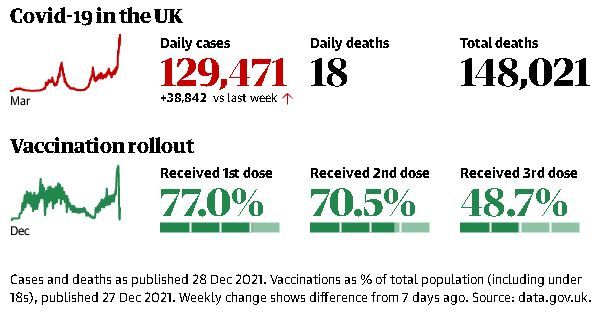
What to do about the UK’s unvaccinated? No 10’s Covid dilemma
A growing sense of frustration with people who have not been vaccinated against Covid has been creeping into the speeches of senior government figures from Sajid Javid to Boris Johnson in recent weeks.
The health secretary has accused those who have chosen not to take up the offer of free vaccination of taking up hospital beds, damaging society and potentially harming their families as well as themselves.
The prime minister also began rolling the pitch for a possibly tougher approach towards the unvaccinated when he spoke of the need for a “national conversation” about how the NHS would cope with the Omicron wave and further new variants.
“I don’t believe we can keep going indefinitely with non-pharmaceutical interventions, restrictions on people’s way of life, just because a substantial proportion of the population still, sadly, has not got vaccinated,” he said.
Given the libertarian instincts of today’s Tory party, No 10 has followed the path of allowing people to choose freely whether or not to get vaccinated, unless they want to work in the NHS and the care sector. A mandatory vaccination policy would almost certainly result in a challenge to Johnson’s authority from his backbenches. Those same MPs, however, are also opposed to national restrictions that hit all of society to prevent the NHS from being overwhelmed.
If another Covid wave were to push the health service to the point of collapse, Downing Street would face two possibilities: lock down everyone or reserve the harshest restrictions for the 5 million people who have declined to be vaccinated in the hope it would ease the burden on hospitals and slow the spread of an outbreak. Javid has estimated that 90% of the most severely ill in hospital at the moment are unvaccinated.

Some countries have already decided that choosing not to be vaccinated should carry a cost, given the impact on wider society of Covid spreading more quickly among the unvaccinated and the greater potential for hospitalisation.
Greece and France went down the Covid passport route as early as July. Israel and Denmark also adopted pass systems early, phased them out, and then brought them back when infections were surging.
In Italy, proof of vaccination, recovery or a negative test has been required for many indoor public places since October and a new super-green pass was added in December that is available only to people who have been vaccinated or recovered from Covid in the last six months.
All moves by the UK government so far to encourage vaccination have been firmly rooted in persuasion and “nudge” theory. It has been almost all carrot and no stick, even when it comes to Covid passports. Ministers insist they should not be called “vaccine passports” because people will be allowed to show a recent lateral flow test result instead.
The approach of encouragement is continuing, with a campaign texting everyone to “get boosted now”. But there also now appears to be an attempt to introduce an element of social stigma to vaccine refusal, and a move to suggest it is people’s civic responsibility to get jabbed.
No 10’s view is that there is still scope to drive up vaccination rates further – particularly when it comes to the booster – and that this is preferable to using vaccination status as a dividing line. Almost 90% of over 12s have now had a first dose, 82% have their second and 56.5% are boosted.
One major missing piece of the puzzle, currently under consideration, is a strategy that gets to the bottom of why 5 million people remained unvaccinated, especially those in communities with an ingrained distrust of authority.
No 10 even turned to an artificial intelligence (AI) company earlier in the year to determine the causes of vaccine hesitancy, but Whitehall sources acknowledge there is still a lack of understanding about how many of the unvaccinated remain so because of entrenched anti-vax ideology, misconceptions that could be turned around, a lack of time or transport to get to vaccine centres, or just apathy.
One option being weighed is the idea of greater personal outreach – learning from the personal touch of GPs who have phoned all their most vulnerable vaccine refusers. Ministers are even thinking about teams of door-to-door vaccinators who could deliver shots on the spot.
If this last push were not to work, however, and further restrictions are deemed necessary, Johnson may have to confront a difficult choice, unpalatable to his party, about whether everyone – the vaccinated and the unvaccinated – are all in it together any more.










